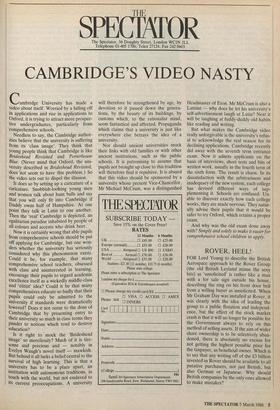T M ;
SPECTATOR
The Spectator, 56 Doughty Street, London WC1N 2LL Telephone 01-405 1706; Telex 27124; Fax 242 0603
CAMBRIDGE'S VIDEO NASTY
Cambridge University has made a video about itself. Worried by a falling off in applications and rise in applications to Oxford, it is trying to attract more prospec- tive undergraduates, particularly from comprehensive schools.
Needless to say, the Cambridge author- ities believe, that the university is suffering from its 'class image'. They think that young people think that Cambridge is like Brideshead Revisited and Porterhouse Blue. (Never mind that Oxford, the uni- versity described in Brideshead Revisited, does 'not seem to have this problem.) So the video sets out to dispel the illusion.
It does so by setting up a caricature of a caricature. Snobbish-looking young men and women talk about hunt balls and say that you will only fit into Cambridge if Daddy owns half of Hampshire. At one point they talk in Latin to one another. Then the 'real' Cambridge is depicted, an egalitarian paradise inhabited by, people of all colours and accents who drink beer.
Now it is certainly wrong that able pupils from comprehensive schools should be put off applying for Cambridge, but one won- ders whether the university has seriously considered why this phenomenon exists. Could it be, for example, that many comprehensive school teachers, obsessed with class and uninterested in learning, encourage their pupils to regard academic excellence itself as a wickedly middle-class and 'elitist' idea? Could it be that many comprehensives educate so badly that their pupils could only be admitted to the university if standards were dramatically lowered? Does it not occur to the dons of Cambridge that by presenting entry to their university so much in class terms they pander to notions which tend to destroy education?
Is it right to mock the 'Brideshead image' so mercilessly? Much of it is tire- some and precious and — notably in Evelyn Waugh's novel itself — mawkish. But behind it all lurks a belief central to the survival of high learning. This is that a university has to be a place apart, an institution with autonomous traditions, in touch with the world, but not enslaved to its current preoccupations. A university will therefore be strengthened by age, by devotion to it passed down the genera- tions, by the beauty of its buildings, by customs which, to the rationalist mind, seem fantastical and affected. Propaganda which claims that a university is just like everywhere else betrays the idea of a university. Nor should ancient universities mock their links with old families or with other ancient institutions, such as the public schools. It is patronising to assume that pupils not brought up close to this tradition will therefore find it repulsive. It is absurd that this video should be sponsored by a university whose present Vice-Chancellor, Mr Michael McCrum, was a distinguished Headmaster of Eton. Mr McCrum is also a Latinist — why does he let his university's self-advertisement laugh at Latin? Next it will be laughing at fuddy-duddy old habits like reading and writing.
But what makes the Cambridge video really unforgivable is the university's refus- al to acknowledge the real reason for its declining applications. Cambridge recently did away with the seventh term entrance exam. Now it admits applicants on the basis of interviews, short tests and bits of written work, usually in the fourth term of the sixth form. The result is chaos. In its dissatisfaction with the arbitrariness and inadequacy of the new system, each college has devised different ways of sup- plementing it. Schools are confused. Un- able to discover exactly how each college works, they are made nervous. They natur- ally advise their pupils that it would be safer to try Oxford, which retains a proper exam.
And why was the old exam done away with? Simply and solely to make it easier for comprehensive school children to apply.


















































 Previous page
Previous page